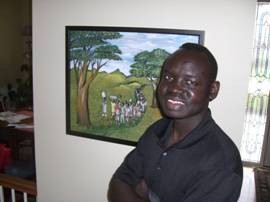
'Lost Boys of Sudan' Speaker to Highlight International Education Week at UC
The University of Cincinnati highlights International Education Week with keynote speaker Bol Aweng, one of the 35,000 so-called Lost Boys who fled southern Sudan during the second Sudanese Civil War. Aweng will detail his life then and now when he speaks at UC from
7-8:30 p.m., Tuesday, Nov. 15, in Room 400 A,B,C of Tangeman University Center (TUC).
The event is free and open to the public.
As a six year old boy, Bol Aweng fled his village in 1987 when it was attacked, bombed and burned by government troops. While walking 1,500 miles to Ethiopia and then to Kenya, he survived attacks by government troops, starvation, illness and attacks by wild animals.
Of the 35,000 Lost Boys that fled Southern Sudan, he was among the 16,000 who safely arrived in Kenya. Aweng spent fourteen years in refugee camps until he was approved for resettlement in the United States by the United Nations High Commissioner for Refugees. He arrived in Nashville, Tenn., in 2001, where he worked at low-wage jobs while earning an associate's degree in computer technology. He then moved to Columbus, Ohio to attend The Ohio State University. Aweng became a U.S. citizen in 2007 and graduated from OSU with a degree in fine arts.
Aweng returned to his Southern Sudanese village of Piol in December 2007. It was a bittersweet reunion with family he had not seen in 20 years. Seeing his mother, meeting new siblings and being with aging grandparents was exceptionally gratifying. However he also learned details of family members who had not survived the destruction of his village. The living conditions in the village deeply concerned him. There were no buildings left after the bombing, only family tukals (huts) had been re-built. Families had very little food and there were no schools. Very few in the village could read or write, and only one person in the village had a job. The only health care was provided by a young man who had a second grade education in English. He had a chair and a card table and a small box of malaria medications, aspirin and cough syrup provided by UNICEF.
At his UC appearance, Aweng will describe how he is using his skills and experience to make a difference in his Sudanese community. He and others are determined to operate a health clinic to meet the basic healthcare needs in their village. Learn more about this project at www.sudanclinic.org.
To learn more about the Lost Boys of Sudan, attend a showing of God Grew Tired of Us prior to the event. The film will be shown from 2-4 p.m., Monday, Nov. 14, in the MainStreet Cinema. See http://www.uc.edu/content/dam/uc/international/docs/List%20of%20All%20IEW%20Events%2011Adraft4.pdf for a complete listing of events scheduled during International Education Week.
International Education Week at UC is an opportunity to celebrate the benefits of international education and exchange worldwide.
The event featuring Bol Aweng is sponsored by the UC African American Cultural and Resource Center, Ethnic Programs and Services, the UC College of Law, UC International Programs and the Division of Student Affairs and Services.
Tags
Related Stories
President Pinto announces interim provost
April 8, 2025
UC President Neville Pinto announced that Dr. John Weidner, dean of the College of Engineering and Applied Science, will step in as interim provost following Dr. Kristi Nelson's departure on June 1.
University of Cincinnati College of Law achieves No. 71 rank in...
April 8, 2025
UC's College of Law is now ranked No. 1 by U.S. News & World Report, reflecting four years of continued upward momentum.
OTR mural celebrates UC alumni success
April 4, 2025
The UC Alumni Association, UCAA, will mark its annual Alumni Celebration during its upcoming Alumni Week, April 7-13, with a community art project commemorating this year’s slate of alumni honorees receiving the organization’s top awards.
